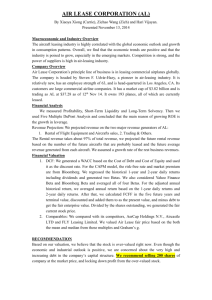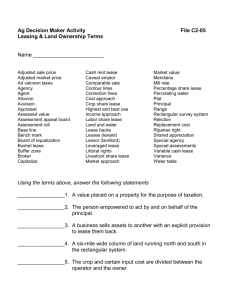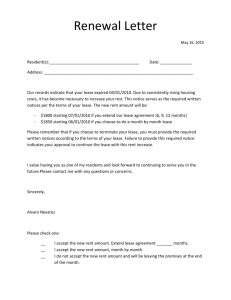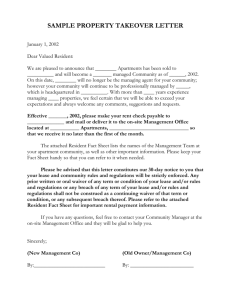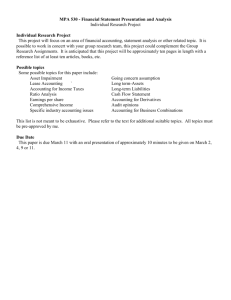Procedure Note: PUR02/2012 Created: 21/02/2012 FINANCE
advertisement
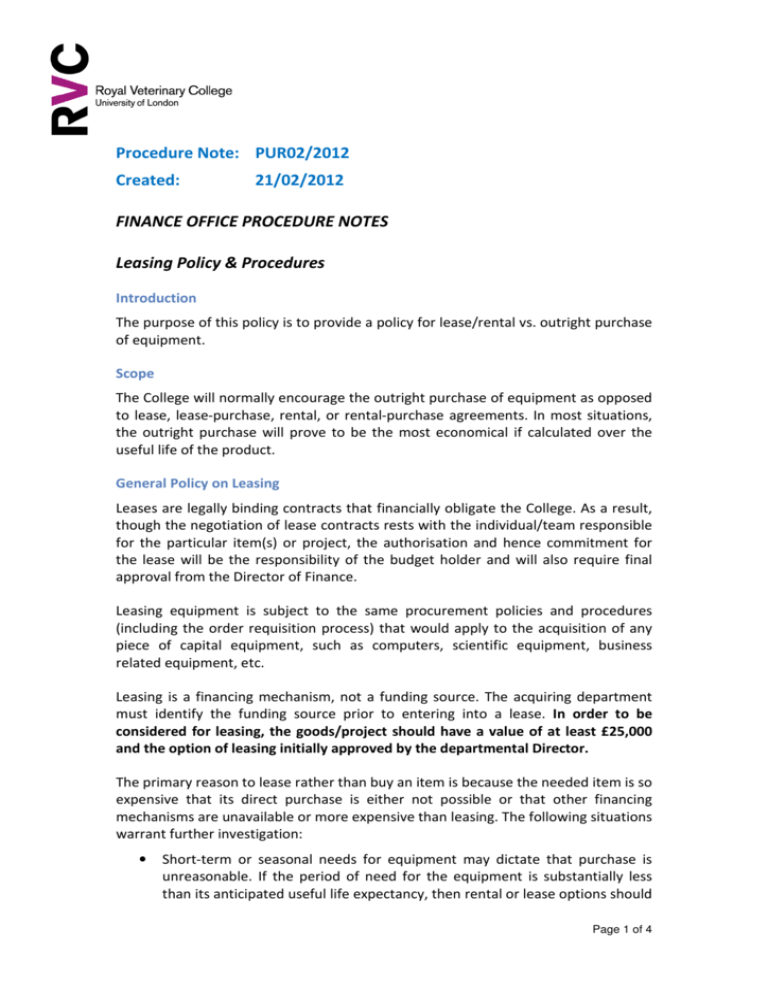
Procedure Note: PUR02/2012 Created: 21/02/2012 FINANCE OFFICE PROCEDURE NOTES Leasing Policy & Procedures Introduction The purpose of this policy is to provide a policy for lease/rental vs. outright purchase of equipment. Scope The College will normally encourage the outright purchase of equipment as opposed to lease, lease-purchase, rental, or rental-purchase agreements. In most situations, the outright purchase will prove to be the most economical if calculated over the useful life of the product. General Policy on Leasing Leases are legally binding contracts that financially obligate the College. As a result, though the negotiation of lease contracts rests with the individual/team responsible for the particular item(s) or project, the authorisation and hence commitment for the lease will be the responsibility of the budget holder and will also require final approval from the Director of Finance. Leasing equipment is subject to the same procurement policies and procedures (including the order requisition process) that would apply to the acquisition of any piece of capital equipment, such as computers, scientific equipment, business related equipment, etc. Leasing is a financing mechanism, not a funding source. The acquiring department must identify the funding source prior to entering into a lease. In order to be considered for leasing, the goods/project should have a value of at least £25,000 and the option of leasing initially approved by the departmental Director. The primary reason to lease rather than buy an item is because the needed item is so expensive that its direct purchase is either not possible or that other financing mechanisms are unavailable or more expensive than leasing. The following situations warrant further investigation: • Short-term or seasonal needs for equipment may dictate that purchase is unreasonable. If the period of need for the equipment is substantially less than its anticipated useful life expectancy, then rental or lease options should Page 1 of 4 be investigated and compared to the purchase cost less the anticipated resale value. • In case of highly technical equipment whose useful life cannot be accurately projected, lease or rental options offered through the manufacturer, the distributor or third parties should be investigated, as a viable alternative to purchase. In such situations analytical comparisons of purchase, lease or rental options should be made to determine which represents the best interest of the College. • Ancillary benefits of the lease or rental (maintenance costs, upgrades, vendor promotions, special marketing incentives) and situations where the net additional cost of lease or rental is less than the cost of money make that type of arrangement the more prudent investment. The lease or buy decision and the identification of the type of lease that would be most appropriate must take into consideration the following criteria: • • • • • Technical and operational useful life of the item(s). Likelihood of continued use beyond the lease term. Budgeting issues. Financing terms (term, cost of borrowing). Type of lease (Operating vs. Capital) and its Financial Statement impact. An analysis will be required to determine whether the goods should be leased or purchased from an economic perspective and with a view to protecting the rights of the College. In addition, the department should seek to obtain financing at the lowest available (negotiated) rate. Types of Leases - Operating vs. Capital Normally at the end of an Operating Lease, the goods leased are returned to the lessor. With a Capital Lease, the College will own the leased item at the end of the term with no additional payments or by paying a predetermined price that is well below the expected fair market value of the goods concerned. An Operating Lease is treated like a series of rental payments, whereas a Capital Lease is recorded as an asset of the College, with a corresponding liability for the full amount of the lease obligation. Leasing Procedures The procedures for leasing equipment are outlined below: Action 1. A Lease Information Form (Schedule I) must be filled out by the requesting department together with all relevant supporting information/business case for the proposed order, and returned to the Finance Department for the attention of the Finance Director. However, before submitting the request form to the Finance Director, there must be approval received from the budget holder for the goods required. Approval from the budget holder must be Responsibility Department Page 2 of 4 based on the total price of the goods requested and not on the projected monthly lease expense. Funds should ordinarily be available within the departmental budget for the requirement. When initiating a requisition for the lease, lease-purchase or longterm rental of equipment, the originating department should clearly explain the necessity or desirability of that type of arrangement. The department must also clarify /confirm whether all maintenance costs are included in the original cost of the lease, or is the College responsible for maintaining the equipment at its own expense. 2. As with regular equipment purchases, departments will follow the College’s standard procedures for processing a Purchase Department Requisition, noting on the form that the equipment is to be leased rather than purchased and will follow the system work-flow + Agresso workflow routing process based on the total level of spend including the routing of the work-flow to the Finance Director for approval. 3. In the event that either the leasing option and/or the proposed funding mechanism are not approved by the Finance Director, he/she will assist in determining the best mechanism for the acquisition and notify the requisitioner. Should leasing be approved, the systems workflow process will be approved so that a purchase order can be completed. Finance Department 4. Once the equipment has been delivered, installed and is working properly, the department will be required to update the central contracts register. It is the department’s responsibility to work with the supplier to ensure that the equipment is delivered, installed, and in a proper working condition. The budget holder and the Director of Finance must then be notified of either acceptance of the equipment or rejection in the event of any damage/failure etc. In the event of any issues, the department shall be responsible to liaise directly with the supplier to rectify the matter and must be resolved prior to lease commencement. Department 5. Upon successful notification from the department, the Director of Finance and the Departmental budget holder shall sign and return to the leasing company the Certificate of Acceptance at which time the lease shall officially begin. Under no circumstances should the Certificate of Acceptance be signed before the equipment has been received, tested, and verified that it is in a satisfactory working condition. Department + Finance Department 6. Payment procedures for all leases will be handled by Accounts Payable. Lease invoices will be sent by the leasing company directly to Accounts Payable and Accounts Payable will determine the appropriate method of payment. Accounts Payable Page 3 of 4 7. Ninety days prior to the expiration of an operating lease, it is the responsibility of the department to determine whether the equipment should be returned, lease contract extended, or purchased, and to notify the Director of Finance of its plans. The department must ensure that it notifies the leasing company of its decision within the date/terms specified within the Master Lease Agreement. Failure to do so is likely to result in additional monthly lease charges. The Director of Finance will assist the department to ensure that the final decision is in the College’s best interest. For re-leasing and buyouts, appropriate purchasing procedures must also be followed. Department + Finance Department 8. If a decision has been made to purchase the equipment outright at the end of an operating lease, the department must liaise with the leasing company to determine/identify fair market value (FMV) of Department the equipment. The department will then be responsible for + Agresso workflow negotiating the final purchase price and then following the appropriate purchasing procedures. Please note that any purchase over £25,000 must follow the normal tendering process. 9. Please note that NO software or installation charges should be leased by the College unless incorporated into the overall cost of the equipment/supply. Note. Page 4 of 4

